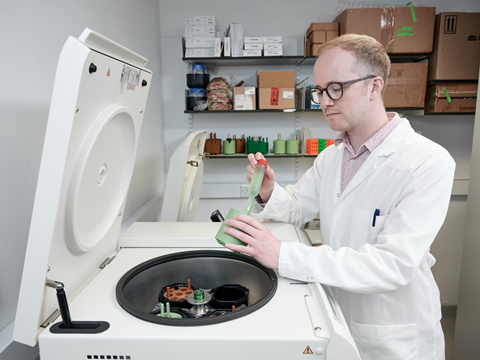
The new Carbon-Loop Sustainable Biomanufacturing Hub will harness microorganisms to turn carbon-based industrial waste into ‘next-generation’ materials and chemicals for the pharmaceutical and cosmetics sectors, among others.
Apparently, over 90% of products manufactured for day-to-day use in the UK are made using fossil fuels and unsustainable chemical processes. In response, the Hub intends to apply engineering principles to biological processes and keep clean materials within a circular economy.
The Hub will also establish the UK’s first BioFactory, a dedicated platform for waste analysis, sustainability evaluation, and scale-up. This is intended to lower emissions, keep materials out of landfill, and pursue the creation of a fossil-free manufacturing base.
Largely funded by UK Research and Innovation (UKRI)’s Engineering and Physical Sciences Research Council, the £14 million Hub – one of four located in the UK – will be led by Professor Stephen Wallace, UKRI Future Leaders Fellow and chair of Chemical Biotechnology at the University of Edinburgh.
The Universities of Manchester, Nottingham, and Surrey, University College London, and Imperial College will also participate, supported by the Edinburgh Innovations commercialization service.
Over forty industry leaders are also involved in the project, including global companies from seven industry sectors, national innovation centres like IBioIC, and such facilities as the Edinburgh Genome Foundry and Imperial’s BRC Genomics Facility.
Microbiologists, chemists, engineers, and sustainability experts all form the Hub’s multidisciplinary research community, which sets out to innovate supply chains and drive the development and adoption of new technologies.
The University of Edinburgh describes its engineering biology researchers as the UK’s ‘most comprehensive group in the discipline’. It also works with over 200 engineering biology-related companies and aims to support and advance local contributors – keeping talent and economic potential within the UK.
“Amid a growing population, diminishing natural resources, and a changing climate, there is now an urgent environmental, industrial, and political imperative to rapidly harness engineering biology technologies to defossilize manufacturing and accelerate the UK’s path to net-zero,” explained Professor Wallace.
“C-Loop brings together diverse expertise from across academic disciplines, industrial sectors, and the entire value chain to drive the growth and scale-up of this emerging technology, unlocking its full climate and economic potential.”
Dr Jen Vanderhoven, chief operating officer at BBIA and chair of the C-Loop Board, continued: “I’m delighted to be part of the C-Loop team for this ambitious, multi-million-pound project harnessing engineering biology to upcycle waste carbon.
“With industry urgently seeking sustainable alternatives to fossil-based inputs, this initiative is critical in driving the transition to above-ground carbon sources.
“There’s no time to waste in getting to no waste – this project not only tackles major environmental challenges but also unlocks significant economic opportunities through the production of sustainable chemicals.”
Professor Charlotte Deane, executive chair of EPSRC, added: “These hubs will play a vital role in reshaping manufacturing to help the UK achieve green growth. By combining deep research expertise with real-world partnerships, they will develop the technologies, tools and systems we need for clean, competitive and resilient industries.”
In a similar vein, a three-year carbon capture and utilization project led by VTT and LUT University has resulted in polypropylene, polyethylene, and other ‘high-value-added’ products derived from carbon dioxide generated by waste incineration and the forest industry.
Meanwhile, the European ViSS project derives PHBV from the cells of a microorganism, purifying them to form a biodegradable powder or plastic granule; this can then be formulated and turned into packaging, film, and other biopolymer products.
Last November, Mondi opened its own innovation hub in Germany, this one housing a research and development centre, an analytical laboratory, pilot lines, and a customer experience centre under one roof. These combined capabilities are hoped to reduce time-to-market for new packaging and paper solutions.
If you liked this story, you might also enjoy:
The ultimate guide to the Packaging and Packaging Waste Regulation in 2025
How are the top brands progressing on packaging sustainability?
Everything you need to know about global packaging sustainability regulation in 2025
The key to increasing the use of reusable packaging in supermarkets













No comments yet